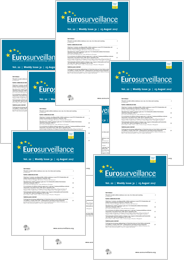- Home
- Weekly releases (1997–2007)
- Previous Issues
- Volume 7, Issue 12, 20/Mar/2003
Weekly releases (1997–2007) - Volume 7, Issue 12, 20 March 2003
Volume 7, Issue 12, 2003
- Articles
-
-
-
Severe Acute Respiratory Syndrome – update
More LessOn 15 March 2003, the World Health Organization (WHO) stated that the Severe Acute Respiratory Syndrome (SARS), an atypical pneumonia of unknown aetiology, is now “a worldwide health threat” (1). As of 19 March, 264 suspect and probable cases have been reported to WHO since 1 February 2003 (2). The surveillance case definitions have been modified (table).
-
-
-
Outbreak of fowl plague (avian influenza) leads to secondary human cases, March 2003, the Netherlands
More LessThe National Institute for Public Health and the Environment (RIVM) in the Netherlands, in collaboration with a multi organisation partnership, has implemented enhanced surveillance in response to the outbreak of highly pathogenic avian influenza (Influenza A/H7N7) in several Dutch poultry farms (1). The latest results (up to 19 March 2003) show that, among the population exposed to infected poultry, there have been 169 persons with acute health problems. Of the 132 persons with conjunctivitis, 29 also reported having ILI.
-
-
-
World TB Day, 24 March 2003 and TB surveillance in Europe
More LessThe theme of World TB day 2003 - "DOTS cured me – it will cure you too!" promotes the worldwide expansion of directly observed treatment-short course (DOTS), a multi pronged TB control strategy including the adoption of standardised patient management and the evaluation of treatment outcome of TB patients. Treatment outcome is a core surveillance indicator recommended to assess the implementation of DOTS. In recent years, DOTS has been adopted increasingly in European countries, especially in the East. The EuroTB annual report 2000 (in press, http://www.eurotb.org/) includes data on treatment outcome for TB cases notified in 1999 in 30 of the 51 countries of the World Health Organization (WHO) European Region. The WHO Global Tuberculosis Control report, available from 24 March 2003 at http://www.who.int/gtb/publications/globrep/index.html, contains current information on the DOTS situation in Europe and the rest of the world.
-
-
-
Compulsory notification of HIV infection within a new system for anonymous reporting of notifiable diseases in France
More LessThe implementation of compulsory notification of HIV in France has been the subject of debate for many years, mainly due to concern for the human rights of patients with HIV, with only AIDS cases being notified. An anonymous reporting system for HIV infection was scheduled to begin in 1999, but this was delayed due to opposition from organisations demanding measures to strengthen patient anonymity and data protection. The new system is the product of extensive collaboration between the Institut de Veille Sanitaire (InVS), patient associations, civil rights groups, health care professionals (microbiologists, clinicians, epidemiologists), the ministry of health, and expert committees (on safety, ethics), all of whom are represented on a steering committee. The new arrangements, which reinforce patient anonymity and data protection, meets the requirements of the parties involved, and has been authorised by the National Commission for data processing and liberty (CNIL), the national authority for the protection of personal data collected on individuals.
-
-
-
Dengue fever in Cairns, Australia – update
More LessThere are now 85 confirmed cases of dengue fever in Cairns as of 19 March 2003. No cases have been reported outside of Cairns in this outbreak. [Rosalie Spencer, Queensland Health – personal communication, 19 March 2003] The areas currently affected are Parramatta Park, Manunda, Cairns North, Yorkeys Knob, and Trinity Beach (1).
-
-
-
Institute of medicine publishes new report on microbial threats to health
More Less“Microbial Threats to health: emergence, detection, and response”, published this week by the Institute of Medicine focuses on the need for renewed commitment faced with the increased impact of infectious diseases in the United States since publication of the landmark report, “Emerging Infections: Microbial Threats to Health in the United States” in 1992. The report’s authors, the Committee on Emerging Microbial Threats to Health in the 21st century, recommend enhanced global capacity for response to infectious diseases and stresses the importance of a robust public health system in responding to any disease outbreak.
-
-
Most Read This Month

-
-
Chikungunya in north-eastern Italy: a summing up of the outbreak
R Angelini , A C Finarelli , P Angelini , C Po , K Petropulacos , G Silvi , P Macini , C Fortuna , G Venturi , F Magurano , C Fiorentini , A Marchi , E Benedetti , P Bucci , S Boros , R Romi , G Majori , M G Ciufolini , L Nicoletti , G Rezza and A Cassone
-
- More Less


